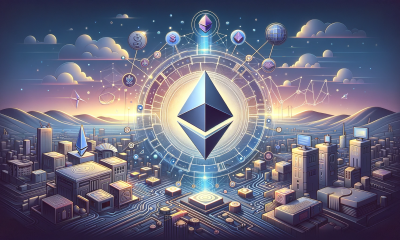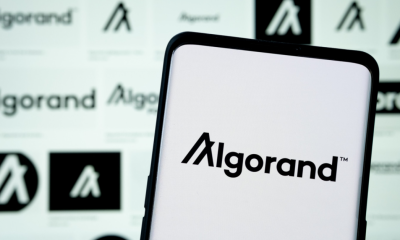Algorand Investor
Investing in Algorand (ALGO) – Everything You Need to Know

By
Gaurav RoySecurities.io maintains rigorous editorial standards and may receive compensation from reviewed links. We are not a registered investment adviser and this is not investment advice. Please view our affiliate disclosure.
Table Of Contents
Algorand USD (ALGO -2%)
Algorand USD (ALGO -2%)
What is Algorand (ALGO)?
Algorand (ALGO -2%) is a pure Proof-of-Stake blockchain platform that uses algorithmic randomness to solve blockchain’s trilemma. Unlike a majority of blockchain projects, Algorand requires minimal computation as it realizes the unique combination of the Proof-of-Stake algorithm rather than Proof-of-Work. As Algorand is a public blockchain platform, developers can use it to build decentralized applications on top of it. The name Algorand is derived from Algorithmic Randomness (Algo + Rand).
It aims to solve the inefficiencies of ledgers, which is the heart of every blockchain project, whether it be Bitcoin, Ethereum, or any other. These include scalability, waste of energy, and high cost of transactions. Algorand uses the advantages of both centralized and decentralized blockchain projects. It is efficient and effective, like a centralized platform and governance model of decentralized projects to ensure accountability.
Founded in 2017 by Silvio Micali, the legal name of the company operating the Algorand blockchain platform is Algorand Inc. Silvio is an MIT professor and is also a recipient of the Turing award and Gödel prize. He is a professor of computer science at MIT. Silvio himself is a well-known cryptographer and also known for being a co-inventor of one of the most important technologies in the crypto world, especially crucial for many private coins, zero-knowledge proofs.
As for his education, he has a Bachelor’s Degree in Mathematics from Sapienza Università di Roma and a Doctorate of Philosophy in Computer Sciences from the University of California, Berkeley. Silvio also has a Postdoc from the University of Toronto. In his LinkedIn profile, Silvio sums up Algorand as “a first-of-its-kind limitless transaction platform, Algorand fulfills the promise of blockchain technology by solving the “Blockchain Trilemma”: offering true decentralization, scalability, and security.”
What Problem Does Algorand Aim to Solve?
To understand what Algorand aims to do, we need to know what other blockchain platforms before Algorand failed to do. After all, Algorand is aiming to solve inefficiencies that ledgers in other blockchain platforms had.
For example, Bitcoin is the first cryptocurrency and is the undisputed leader in the crypto space. It holds the title of the largest cryptocurrency by market cap since the beginning. Ethereum, the second-largest cryptocurrency by market cap for years, is well-known for being the go-to platform for building decentralized applications. What is common between these two? Well, both use a distributed ledger to store transactions, contracts, and more. But the issue with their distributed ledger is that they are inefficient in their current form. Ethereum, though better than Bitcoin. It, too, is suffering from scalability issues.
In short, the blockchain platforms before Algorand failed to solve the much-publicized problems in the crypto space, known as Blockchain Trilemma: Security, Scalability, and Decentralization. It is essential to solving these problems to take the blockchain industry to the next level. Algorand solves the Blockchain Trilemma through its innovative solutions.
Security
Security issues in blockchain space can give rise to various issues such as merchants not receiving their payments after sending the goods or offering services. An expert hacker can leverage a loophole to exploit the situation and spend a cryptocurrency twice, known as double-spend in blockchain terminology. Though it is very difficult to carry out a double-spend attack, it may become a reality if a hacker can disrupt the blockchain network of any platform.
A situation known as a 51% attack is a dreaded theoretical scenario where a miner or group of miners holding 51% or more of Bitcoin mining hash power will have enough resources combinedly to execute a double spend. In January 2021, Bitcoin prices dropped more than 11% over the fears that a Bitcoin double-spending attack took place in reality. It turned out to be false, but there was panic all around.
Algorand has implemented a creative solution to offer security within the Algorand Network. Byzantine consensus-based Pure Proof-of-Stake (PPOS) is the core part of how Algorand operates. Unlike the Proof-of-Stake mechanism (POS), Algorand’s PPOS mechanism factors in the honest majority of Algorand tokens instead of relying on a tiny portion of the entire ecosystem. It is how Algorand keeps the network secured. The process of selecting block proposers and verifiers is random.
In Algorand, no majority controls the network. Generating blocks is not limited to a small group of users. Also, there is no delegation process in Algorand. Instead, every Algorand token holder plays a crucial role in the Algorand blockchain by participating, proposing, and casting their votes. The users do not have to lock in their Algorand tokens through a staking process to participate in consensus, unlike Bonded Proof-of-Stake. They can keep the tokens in their wallets or any other similar instruments supporting the storage of Algorand tokens within the network. The good thing about this model is that the user is free to spend their tokens if they want to. Also, the only person that knows who has become a part of the committee handling the new block of the transaction is the selected persons themselves. We can understand this better through an example:
Let’s say Mr. X becomes a part of the committee. The only person to know that is Mr. X himself. No one else will have that knowledge in the beginning. Now, he will have a role in the committee handling a new block of transactions. To play their role within the committee, Mr. X will make their ticket public on the Alorand network with an M. It is digitally signed by him. Here Mr. X will send only one message to verify the transaction, and that requires him to propagate the digital ticket along with the digitally signed M proving that Mr. X is, indeed, a part of the committee.
For every new block, committee members have to send multiple messages. But after just one message, the identity of Mr. X is disclosed. So it is possible for anyone with malicious intent to reach out to Mr. X and influence him to afflict a denial of service attack on the network. But Algorand solves this issue perfectly through random selection of block committee members for sending new rounds of messages to create blocks of transactions. Thus, Mr. X will not be a part of the committee sending the second round of messages and so forth. So there is no use in knowing now that Mr. X was the part of the committee after they had sent their message.
So, what is the benefit of this secrecy? Well, a person with malicious intent will not be able to carry out their plans if they do not know who has won the lottery to become a part of the committee. Without this knowledge, they cannot corrupt the committee member. They do get to know who became part of the block committee. But that happens after they have played their role, which is to send a message. Hence, the possibility of a denial of service attack is negated through this route. Thus, Algorand blockchain is far more secure than many other blockchain networks available today.
Scalability
As for scalability, we are already seeing how increasing usage of DeFi applications is putting stress on the Ethereum network. Recently, an increase in the number of meme coin transactions on the Ethereum network caused havoc, leading to an absurd rise in the cost of transactions on the Ethereum network. It is all because the Ethereum network is congested and is now suffering because it is not scalable enough to accommodate such a growth in the number of users. Uniswap users were complaining about a 10X increase in transaction costs as they had to pay gas fees in double digits and sometimes in triple digits to execute even small transactions.
Algorand’s Pure Proof-of-Stake mechanism solves the scalability issues too. As we said, Algorand’s way of choosing block proposers and verifiers is random. Thus, only a handful of messages are required for consensus. Hence, Algorand is a highly scalable network.
Decentralization
Decentralization is the core aspect of blockchain. Algorands empowers its community to shape the future of the network by involving them in all the decisions on all technical, policy, or monetary aspects of the ecosystem. Algorithmic randomness plays a crucial role in making Algorand a truly decentralized blockchain.
Let us ask you a question. What is truly decentralized blockchain? Is it the governance model? Perhaps, the way token distribution takes place? Algorand believes that if every block of transactions in a blockchain is handled by a new set of participants, it will achieve a true form of decentralization. Also, the nodes running the system are from different countries and different backgrounds, which adds to the truly decentralized nature of the Algorand blockchain.
Algorand Use Cases
Hundreds of businesses are using Algorand today. It includes Circle, Republic, Tether, Archax, Meld Gold, Marshall Islands, Global Carbon Holdings, StakerDAO, Hummingboat, Instimatch, Opulus, Voyager Digital, Asset Block, and more. Archax, for instance, is working with Algorand to develop financial products for sale on FCA-regulated exchanges. Tether uses Algorand to process over 1000 transactions per second.
The Marshall Islands used Archax to power its digital currency and enable the island nation to join the global economy. Instimatch is leveraging the Algorand blockchain platform to roll out a plethora of services, including Islamic banking, RegTech, Payments, etc. Ditto, a well-known global music distribution company uses Algorand to power some specific tasks in its Opulous initiative, which is aimed at creating more opportunities for musicians.
Vertex is an established digital commerce platform, specifically for physical and digital aerospace and medical products. They are working with Algorand to remove middlemen and streamline the process of buying from the platform by eliminating the additional costs. As for Climate Trade & its customers, Algorand will act as its primary infrastructure layer. The most recent use case of Algorand is that of the Exodus, as they are using Algorand blockchain to issue security tokens.
ALGO – The Native Token of Algorand
The maximum supply of Algorand tokens is 10 billion, whereas its total supply is over 5.54 billion. As for its circulating supply, it is 3.06 billion at the time of writing. A total of 3 billion ALGO tokens were set aside to increase the circulating supply of it over five years, whereas 1.75 billion ALGO tokens are for participation rewards, which will be distributed over time. Then, 2.5 billion ALGO tokens are for Relay node operators, which they will earn overtime. Algorand Foundation & Algorand, Inc. will receive 2.5 billion ALGO tokens. Algorand has also set aside 0.25 billion tokens for end-user grants, which, too, will be distributed over time.
How to Buy Algorand (ALGO)
Algorand (ALGO) is currently available for purchase on the following exchanges.
Uphold – This is one of the top exchanges for United States residents that offers a wide range of cryptocurrencies. Germany & Netherlands are prohibited.
Uphold Disclaimer: Terms Apply. Cryptoassets are highly volatile. Your capital is at risk. Don’t invest unless you’re prepared to lose all the money you invest. This is a high-risk investment, and you should not expect to be protected if something goes wrong.
Coinbase – A publicly traded exchange listed on the NASDAQ. Coinbase accepts residents from 100+ countries, including Australia, Canada, France, Germany, Netherlands, Singapore, the United Kingdom, and the United States (excluding Hawaii).
Kraken – Founded in 2011, Kraken is one of the most trusted names in the industry and offers trading access to over 190 countries, including Australia, Canada, Europe, and the United States (excluding Maine, and New York).
Kraken Disclaimer: Not investment advice. Crypto trading involves risk of loss. Payward European Solutions Limited t/a Kraken is authorised by the Central Bank of Ireland.
Algorand – The Answer to Blockchain’s Trilemma
One thing has been clear this year that scalability is one of the most crucial virtues of a blockchain platform. It has especially become a hotly debated topic after Ethereum gas fees became absurdly high. As a go-to blockchain platform powering a majority share of DeFi applications and a large number of ERC-20 coins in circulation, rising Ethereum fees caused frustration for millions of users. Bitcoin transactions, too, have become slower and costlier over time.
Binance Smart Chain has been gaining market share for some time now, and now, many DeFi applications are built on it. But the increasing number of rug pulls, flash loan attacks, and hacks in Binance Smart Chain-based DeFi applications is raising an important question – Is Binance Smart Chain, a blockchain that runs parallel to Binance Chain, secure enough? Another issue with Binance Smart Chain is that it is centralized.
As we see, most of the leading blockchains like Bitcoin, Ethereum, and Binance Smart Chain are still suffering from what we call the Blockchain Trilemma. It includes security, scalability, and decentralization. That is where Algorand makes a difference as its unique Pure Proof-of-Stake mechanism makes Algorand truly unique. Overall, Algorand is a hidden gem in the blockchain space.
Gaurav started trading cryptocurrencies in 2017 and has fallen in love with the crypto space ever since. His interest in everything crypto turned him into a writer specializing in cryptocurrencies and blockchain. Soon he found himself working with crypto companies and media outlets. He is also a big-time Batman fan.











